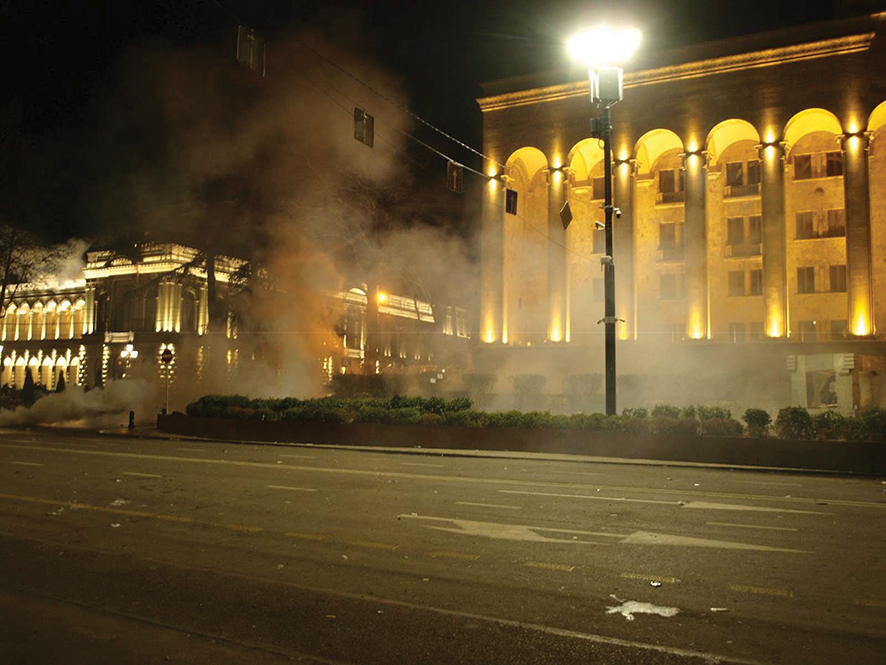The situation in the country has become more volatile than ever, following the introduction of the planned and controversial “foreign agents” bill. Reactions of criticism from the United States, various European Union leaders, and an overwhelming number of public and private figureheads in Georgia itself have demanded its withdrawal. Despite this, the ruling party and the bill’s authors have stood their ground, until now.
After two nights of some of the most violent protests to rock the capital in over a decade, multiple reported arrests, injuries on both sides of the line, and damaged property, the bill now seems dead in the water.
According to the Ministry of Internal Affairs, 133 people were arrested between the two nights.
“The employees of the Ministry of Internal Affairs, as a result of operational measures and investigative actions carried out on March 7-8 of this year, on the facts of law violations that occurred during the protest action held in the vicinity of the Parliament, in particular, on the fact of the attack on the policemen, under Article 353 Prima of the Criminal Code of Georgia, one person In accordance with Articles 166 and 173 of the Code of Administrative Offenses, a total of 133 persons have been arrested,” the ministry reports.
The violence seems to have achieved its mission. Georgian Dream, together with People’s Power party, released a statement that said the bill has been rescinded. “We have decided to unconditionally withdraw the bill we supported without any reservations,” they announced in a joint statement on their website.
This victory, bittersweet as it is, is unlikely to be the last time the ruling party and the people are forced to square off in the public arena.
Russia’s hand in the internal affairs of Georgia is virtually agreed upon by those who observe the geopolitics of the South Caucasus. The majority of the debate focuses on the severity and level of control the Kremlin has over the actions of certain political entities. Georgian Dream, despite being called pro-Russian by many in the opposition, has also leveled similar accusations against opposition members themselves.

The Russian “boogeyman” in Georgia is not a strawman or false enemy. There is plenty of interest for Russia to maintain control in the region for them to invest the resources to keep the area calm. However, one facet of this has been the relationship between law enforcement and the ruling party.
The parallel between the Ukrainian Berkut, special police trained in brutal repression tactics, and the “spetsnazi” or Georgia’s own special police has been drawn. Their brutal and unprofessional treatment of both press and protestor alike was on display on both nights. Press officials, clearly marked and conducting themselves in the course of their reporting, were accosted and harassed, even assaulted on a few occasions by unruly police.
While the rank-and-file police officer is unlikely to be directly influenced by any of the larger politics, the leadership and commanders would be easy to control for someone with the right political power and influence. Similar to the Berkut, holding their high police rank, potential financial benefits, and other blackmail over the heads of these commanders would instantly turn them into pawns. By the very nature of this mechanism, their professional future in law enforcement would be tied at the hip to the political survivability of the party in control.
Georgian Dream chairman Irakli Kobakhidze thanked the police “for their patience and acting in accordance with the best human rights standards.” He also called the opposition “spies” and blamed them directly for organizing the violent acts, scuttling the possibility of mending ties and a return to normalcy. He also targeted EU leaders who have worked tirelessly to support Georgia politically, financially, and geopolitically.
“We won’t act by the agenda of the radicals and [Member of the European Parliament] Viola von Cramon; we will act in the interests of Georgian society,” he proclaimed. He went on to say that the Euromaidan protests in Ukraine in 2014 were not the same. According to Kobakhidze, the Maidan movement only brought war, destruction, and a loss of Ukrainian territory to Russia. “Ukraine lost Crimea and big parts of Luhansk and Donetsk, and today’s big war in Ukraine is the continuation of that.” While he is obviously not spending any money on a hair dresser, perhaps some of his monthly pay could be used on geopolitics studies.
Finishing up, he said that the people have not dissuaded his party from pursuing another form of the foreign agents’ bill aimed at “funding transparency.” This is likely a nod to the next iteration of their attempt to censor and disrupt opposition and any organization that is deemed excessively onerous to the plans of his party. As a result, the proverbial and literal battle has been won, but the political war has only just started.
By Michael Godwin














